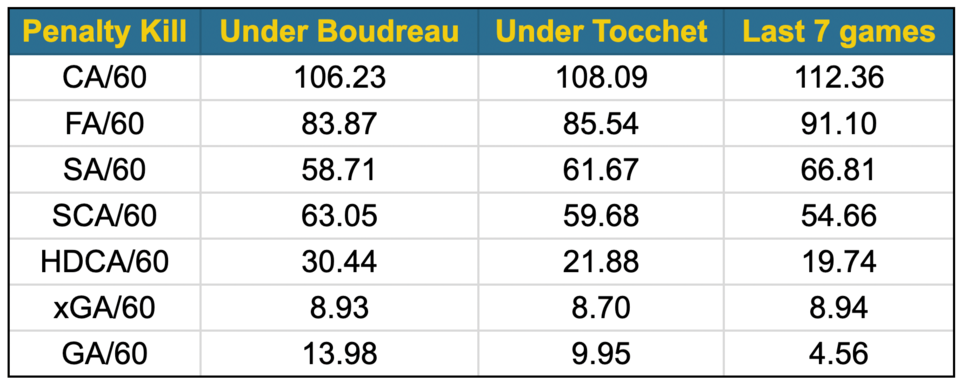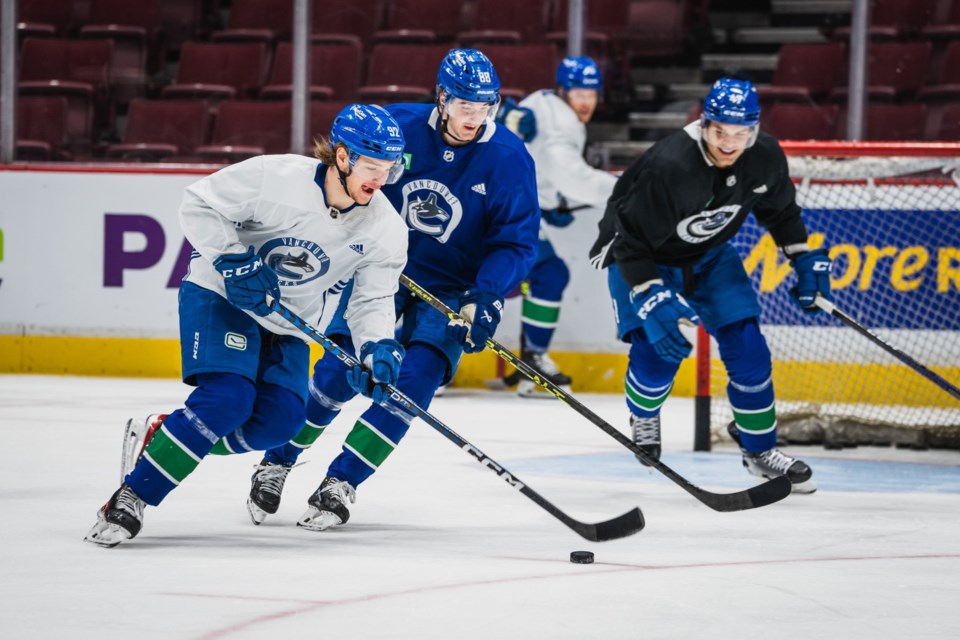The Vancouver Canucks might not make history this season after all.
The Canucks’ penalty kill has been shockingly bad this season right from the very first game against the Edmonton Oilers. They allowed three goals on four opportunities in that game and gave up a power play goal in all but one of their first 16 games.
There were multiple reasons why the Canucks got off to a 4-9-3 start to the season but the penalty kill was chief among them. At 61.8%, it wasn’t just bad, it was potentially historically bad.
The worst penalty kill of all time — at least since the NHL began recording the statistic — belongs to the 1979-80 Los Angeles Kings, who killed just 68.2% of their penalties.
The Canucks have been below that bar all season long, on pace to set a new record in penalty-killing futility. At least, they were below that bar right up until Wednesday night against the Anaheim Ducks.
Canucks have barely cleared Kings' kill
The Canucks killed off both of the penalties they took against the Ducks and the 2-for-2 penalty kill pushed their penalty-killing percentage for the season above the record, if only just barely at 68.3%.
The 2-for-2 night is part of a strong stretch for the penalty kill in recent games. Over the last four games, the Canucks have killed off 11 of 12 penalties and they killed off 9 of 11 penalties in the three games before that. That has included a few 5-on-3 situations that the Canucks managed to kill off.
As an added bonus, the penalty kill has chipped in offensively, scoring eight shorthanded goals since Rick Tocchet took over as head coach.
It helps that Thatcher Demko has returned and Arturs Silovs has played well, providing some calming stability in net but there have been other clear changes. They’re allowing fewer cross-seam passes through the slot, a problem that has plagued them all season and made life exceptionally difficult for their goaltenders on the penalty kill.
It has taken time, however. After Tocchet came in as head coach with Sergei Gonchar and Adam Foote in tow as assistant coaches, the penalty kill still struggled at first. Since the coaching change, the Canucks penalty kill is operating at 73.7%, which is ranked 27th in the NHL in that time, still well below league average.
That’s been enough, however, to get the Canucks ahead of the 1979-80 Kings. Now the challenge is to stay there.
The underlying numbers haven't changed much on the penalty kill
What’s interesting about the improvement in the penalty kill is that it hasn’t really shown up in the advanced statistics — or, at least, the publicly available ones.
Looking at the analytics available from Natural Stat Trick, the Canucks have actually allowed a higher rate of shot attempts and shots on goal on the penalty kill under Tocchet than they did under Bruce Boudreau.

A quick glossary:
- CA/60 - corsi against per 60 minutes. Corsi is shot attempts.
- FA/60 - fenwick against per 60 minutes. Fenwick is unblocked shot attempts.
- SA/60 - shots on goal against per 60 minutes.
- SCA/60 - scoring chances against per 60 minutes.
- HDCA/60 - high danger chances against per 60 minutes.
- xGA/60 - expected goals against per 60 minutes based on shot quality and quantity.
- GA/60 - actual goals against per 60 minutes.
While the Canucks have allowed more shots, both blocked and unblocked, they’ve reduced the number of scoring chances and high-danger chances against under Tocchet, particularly in more recent games.
Still, their expected goals against remains about the same, which speaks to something I’ve been saying for quite some time: the Canucks’ expected goals against hasn’t taken into account one of the prime drivers of shot quality against them, which is pre-shot puck movement.
The expected goals statistic takes into account a wide variety of factors, such as shot location, shot type, and whether it’s a rebound chance. It can’t, however, include whether there was a pass directly before the shot, as that’s not available in the NHL’s public play-by-play data. For a team like the Canucks that was allowing dangerous cross-seam passes at an absurd rate, their expected goals against, especially on the penalty kill, was far lower than it rightfully should have been.
The reduction in high-danger chances against might be the most encouraging statistic. That includes the many backdoor tap-in chances the Canucks were regularly giving up on the penalty kill and indicates that they’re doing a lot better at defending the middle of the ice.
Personnel changes might have also helped the penalty kill
One might suggest that the removal of Curtis Lazar, Ethan Bear, and Oliver Ekman-Larsson from the penalty kill — one via trade and two via injury — might play a role in the improved penalty kill. Those three players had the highest rate of goals against on the penalty kill for the Canucks this season.
Luke Schenn and Ilya Mikheyev, also off the Canucks roster via trade and injury, have the fifth and sixth-highest rate of goals against on the penalty kill this season.
Perhaps there is a personnel component to go with a systems component in the Canucks’ improved penalty kill. Players called up from the AHL like Guillaume Brisebois, Nils Åman, Noah Juulsen, and Phil di Giuseppe have filled in capably for the absent penalty killers. Is that because they’re better penalty killers or have they been taught a better system with the Abbotsford Canucks?
The question now is whether the Canucks can keep it going. They have passed the 1979-80 Kings by the slimmest possible margin but could slip back below the Kings with another bad stretch of games.
As it is, it looks like the Canucks will avoid making history this season.




